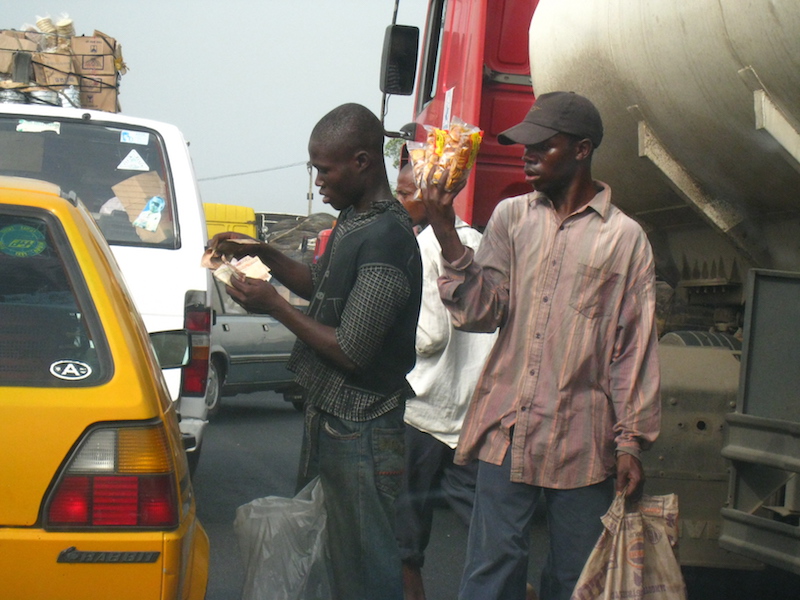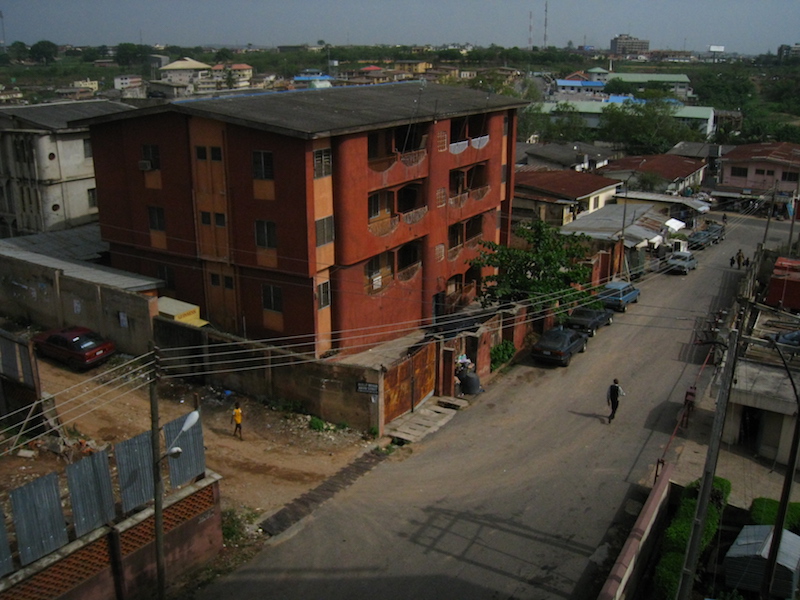Seated in the row in front of me, two U.S. State Department workers are awfully boisterous for a 4am take-off. As passengers file into their rows, I hear them discussing something about St. Ives and mayonnaise. Having not slept the night prior, I am too sluggish to take part in their conversation. Honestly, St. Ives and mayonnaise? I hear a stewardess explain to the man on my right that the only difference between the regular and vegetarian breakfasts is the yogurt. That piques my interest, but again, I am too tired to investigate further. The man to my left attempts to purchase two remote-controlled Kenya Airways planes for his boys, but learning that there is only one available, he proceeds to go to sleep. Unable to think any more, I follow suit, shutting my eyes, drifting off into my traditional in flight nap, and when I wake up I am in the exact same position – although in an entirely different country.
##
I landed in Nairobi, Kenya just after 6am. With 7 hours until my next flight, I purchased a transit visa for $20 and walked to the information desk to inquire about how to get into the city. It was either a $20 taxi or a 75 cent bus. Hmm. I asked where the bus station was, skittered through a hoard of aggressive taxi drivers posted outside the airport, and found myself nuzzled against the backseat window of the M2 bus within a matter of minutes. I struggled to stay awake, my eyes wearily gazing out the window at the hubbub of Nairobi’s outskirts – slums, stalls, wild animals, all kinds of commotion for such an early morning. Over the last few weeks, I have been flipping my way through Dark Star Safari, by Paul Theroux (thanks again for the read, Dan!), and chanced upon a passage that describes my view quite well:
We were hardly past Thika, which had once been the countryside, written about in an amiable way as a rural idyll by Elspeth Huxley, who had grown up there. Now it was a congested maze of impoverished houses and streets thick with lurking kids and traffic and an odor of decrepitude: sewage, garbage, open drains, the stink of citified Africa.
Going slowly our car was surrounded by ragged children pleading for money and trying to insert their hands through the half-open windows.
An hour later, as the buildings grew tall and the populace more dense, I lazily stepped off the bus, eager to pass the time in downtown Nairobi. The city teemed with activity – at 9am, suits rushed to work. I walked slowly, past hole-in-the-wall pharmacies, clothing stalls, phone-card distributors, unidentifiable statues, and legislative buildings. I saw a 50-person marching band in full regalia toot and stomp their way into a nearby conference center. I had no idea what they were playing. I walked outside the city core into a quieter area with fountains and various shrubbery. I stopped to watch a group of 15-odd men push a stalled bus back into oncoming traffic. Honking, a refined, very tangible language in the developing world, dominated the streets. It started to drizzle, so I turned around, eager to find a bite to eat.
It was then that I met George Bulayo. He approached me, introducing himself as a teacher, asking humbly for my time to ask questions about America. I was thrilled. We turned the corner and walked into Mandy’s Restaurant, a seedy but comfortable nook that offered pastries and breakfast beverages. George, originally from Zimbabwe, recently emigrated to Nairobi because there was no longer work for him in Harare, the capital city. A teacher of English Literature, History, and World Geography, George explained that because of President Mugabe’s extreme politics, ultra-high inflation, and food insecurity, schools – unable to feed their students and maintain their finances – were shutting down. We talked about Africa, about America, about Obama. I explained how an unregulated Wall Street contributed to the economic crisis. We chatted about the Bush Administration, about Iraq, about discrimination.
This is where things get fuzzy. At some point during our meeting, George shifted the conversation. I remember him saying that he didn’t want to offend me, and that he does not like to propel color-based stereotypes by asking a white man for money. He explained that the reason he came to Nairobi as a stopping point en route to Djibouti, where a resistance movement to overthrow President Mugabe is currently based. I didn’t understand the specifics, but his plans involve a seemingly impossible train trip with two fellow teachers. I knew I had to make a decision but struggled to act. In my travels, I have had the chance to meet a lot of people, and in doing so have developed an acute awareness of personalities and intentions. George was one of the more trusting people that I had met, but I still had a hard time digesting/unraveling his story. I handed him what I felt an appropriate amount of local currency, justifying my gift with the good company that George provided for the better part of an hour.
I settled into my aisle seat, happy that the space to my left was unoccupied. It was a 10+ hour flight to Lagos, so every bit of comfort counted. Like clockwork, as soon as the plane took off, I grew weary. Between fleeting, sporadic moments of consciousness, I fixed my eyes outside the cabin window. Popcorn puffs of whites and blues – my brother knows the technical cloud terms. I couldn’t help but think of the vast expanse of land below. So much of it is so foreign – the history, the politics, the tribal divisions – and I suddenly felt very small.
In Cotonou, the plane’s first of two stops, a group of unruly passengers from the back of the plane stormed the front cabin. Apparently – and to me this is hilarious – they were not aware that the flight was not direct from Nairobi to Lagos. “You, Kenya Airways, are wasting my time,” one particularly outraged passenger shouted loud enough for the entire plane to hear. Eventually the hustle-bustle subsided, and it was then that I shut my eyes for the third time. The plane stopped again in Abidjan. I drank some water, relieved myself in the bathroom, and went back to sleep. A few hours later, I woke up in Lagos.
In Nairobi, during my 7-hour layover, I had called my hotel in Lagos to arrange a taxi pickup, as my company had advised me against taking a local cab so late at night. Passing through customs and into baggage claim, after 20+ hours of travel, I was happy to see my name scribbled in block letters on a white sheet of paper. With traffic, the trip to the hotel can take up to 2 hours, but luckily I was dropped off in 25 minutes.
The hotel, like Nairobi earlier in the day, was swarming with activity. During check-in and registration, I was told that I would be the first person staying in the room. Crumbs of tile on the bathroom floor reinforced how new the room was. I took a shower under the Amazonian waterfall-like pressure and blissfully passed out.
Today, this morning, I slept in, finding a mid-morning taxi to take me to my first survey destination, a modern mall with attached supermarket. The traffic looked abysmal, and at the hotel they said that the trip could take up to an hour. For the second time, the traffic gods were on my side, as the ride took 15 minutes, and before no time I was back to good-old-fashioned-surveying. Oh the work felt good.
In the supermarket, at a sausage sampling station, a man grabbed a whole sausage from the grill and said, “I am taking a big one, and there is nothing you can do.”
“That’s pork, you know,” said the woman in charge of distributing the cut-up pieces.
“Allah will forgive me,” the man retorted.
The ride home took significantly longer than this morning. Lagos traffic is phenomenally frustrating (or frustratingly phenomenal?!?). While cars are idling, street urchins sell patterned dish rags, local magazines, boxed cookies, drinks, gum, and mobile phone cards. My driver dodges them all, taking a left to avoid further delay. A few minutes later, we arrive at the hotel. Excited to type out my thoughts, I sit down to dinner with my laptop. I start laughing hysterically as the song Africa, by Toto begins playing over the background speakers. One of the restaurant staff catches me singing along and stifles a chuckle. Phil, karaoke when I get back?
A busy few days ahead – I’ll be in touch.
 In America, we sell hot dogs on the street. Here they sell just about everything – just this morning, half-melted packages of Fanice ice cream, dried fish, and car floor rubber mats caught my eye. A man, selling Hercules Mouse Boards (designed to kill domestic rodents), had very real, very pungent dead rats dangling from his other hand to demonstrate the validity of his product. Driving through town is always a spectacle for me. Motorcycle taxis that haul a passenger in and out of traffic, on and off the sidewalk, over the broken, sun-bleached roads – it’s fascinating to watch. Especially when the passenger’s baby is strapped to her back, the baby’s head precariously bobbing up and down with each turn of the bike.
In America, we sell hot dogs on the street. Here they sell just about everything – just this morning, half-melted packages of Fanice ice cream, dried fish, and car floor rubber mats caught my eye. A man, selling Hercules Mouse Boards (designed to kill domestic rodents), had very real, very pungent dead rats dangling from his other hand to demonstrate the validity of his product. Driving through town is always a spectacle for me. Motorcycle taxis that haul a passenger in and out of traffic, on and off the sidewalk, over the broken, sun-bleached roads – it’s fascinating to watch. Especially when the passenger’s baby is strapped to her back, the baby’s head precariously bobbing up and down with each turn of the bike.


 A few weeks ago, I came across a diamond in the rough. It was early in the morning, and I was thumbing through books in the Abuja airport, trying desperately to stay awake for my Virgin Nigeria boarding call. I am always interested to see which booksmake it to the far corners of the Earth, and in this particularly seedy shop, it was an interesting blend of business and self-help titles, with a few Obama memoirs. Then I found it:
A few weeks ago, I came across a diamond in the rough. It was early in the morning, and I was thumbing through books in the Abuja airport, trying desperately to stay awake for my Virgin Nigeria boarding call. I am always interested to see which booksmake it to the far corners of the Earth, and in this particularly seedy shop, it was an interesting blend of business and self-help titles, with a few Obama memoirs. Then I found it: 